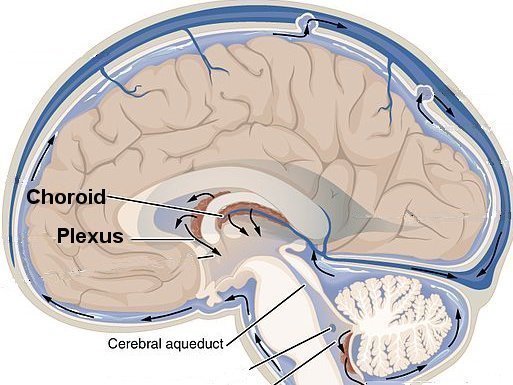Prolactin, Sense of Smell, the Kidneys, and Trauma: What’s the Connection?
The production of prolactin does not seem to play as much or a role in mental health as the number of prolactin receptors that exist to take up the prolactin. The highest number of prolactin receptors are located in the choroid plexus. The choroid plexus is a network of blood vessels located on both sides of the brain from which the cerebrospinal fluid is derived. The choroid plexus is directly connected to the sympathetic, fight-or-flight branch of the autonomic nervous system and indeed, electrical stimulation the sympathetic nerves in the cervical ganglia can cause a 30% reduction in the production of cerebrospinal fluid. Cutting sympathetic nervous system nerves, in contrast, causes a pronounced increase in cerebrospinal fluid production. So the choroid plexus, where most of the prolactin receptors are located, is heavily influenced by sympathetic nervous system activity.
The sympathetic nervous system is the part of our body that receives, stores, and reacts to stressful situations. Most people know this branch of the autonomic nervous system as the part of the body that works to produce the fight-or-flight response.
Scientists believe that the prolactin that’s released in the choroid plexus to interact with the most concentrated grouping of prolactin receptors in the body, can impacts the production of olfactory neurons and thus sense of smell, a fact worth noting in regard to the formation of memories (which is tightly linked in the brain to olfactory neurons) among other things. Prolactin, via its impact on the production of olfactory neurons may impact neural circuits that regulate our attraction to a particular mate and it may also regulate our ability to bond with a new infant. Indeed, based on animal research studies, the olfactory nerves may also play a role somehow in maintaining prolactin levels such that prolactin and our sense of smell work together.
It may seem insignificant to note that sense of smell and prolactin levels in the body are tightly connected, but our sense of smell is also connected anatomically to our emotional memories. The olfactory bulb in the nose, where our sense of smell comes from, is a structure that directly connects to the limbic system, the amygdala, and the hippocampus, the areas of the brain that have the biggest impact on emotion and memory. In fact, our sense of smell is one of the first senses to register in relation to feelings and memories because it has such a short and direct line to these emotion-memory centers of the brain.
Women who have recently been pregnant should also note that chronic kidney disease is correlated with a deterioration in sense of smell. During pregnancy, one of the organs that undergoes the most dramatic change in structure is the kidneys. During pregnancy, the kidneys can increase in size by several centimeters to accommodate for the extra toxic load that a growing fetus puts on the body. The kidneys, in fact, are in the spotlight in terms of the serious illnesses that can happen as a result of pregnancy, namely gestational diabetes and pre-eclampsia / eclampsia. Women who develop a sudden spike in high blood pressure during the last trimester of pregnancy (a sign that pre-eclampsia or eclampsia might be developing) should note that health issues involving the kidneys at the end of pregnancy can impact prolactin as well as sense of smell. A lack of sense of smell can, in turn, impact bonding and attraction of a mother to her child as well as a mother’s ability to enjoy eating food (since much of our sense of taste is actually a sense of smell).
Click here to learn more about how the kidneys change during pregnancy.
This relationship between sense of smell and prolactin levels is noteworthy, though, in terms of mental health because prolactin is operating in powerful ways in areas of the brain that are significant in terms of trauma. This is the part of the brain that mediates between the mind and the body. In fact, having a urinary tract infection involving the kidneys or the bladder (or both) during pregnancy has been scientifically shown to significantly increase the risk of postpartum depression, postpartum anxiety, and other postpartum mental health issues.
In Traditional Chinese Medicine, the kidneys are the organs that process fear. In modern psychiatry and psychology, we might instead say that the kidneys process trauma. The proper release and processing of trauma by the kidneys may, in turn, be connected to our sense of smell via prolactin and the olfactory nerves that makes it possible for us to smell (and taste) things.
Though the science surrounding these connections between sense of smell, the kidneys, prolactin, trauma, and the choroid plexus is not well-understood particularly in terms of how they all relate during and after pregnancy, this connection among these various things is fairly well-represented in Traditional Chinese Medicine, a system which looks more closely at the movement of energy in the body as opposed to the anatomical structures of the body. For women who are heavily indoctrinated and committed to western conventional medicine, seeing this scientifically validated connection between western concepts involving the kidneys, trauma, the sympathetic nervous system (via the choroid plexus) and prolactin, (a breastfeeding hormone that is linked to trauma and thus postpartum mental health problems) might be useful. If you’re looking for a natural cure for postpartum depression or postpartum anxiety or even psychosis, begin with the kidneys especially if you had pre-eclampsia, eclampsia, gestational diabetes, a urinary tract infection, or kidney infection during pregnancy. Take herbs to strengthen the kidneys and stay hydrated with water that has been charged with trace minerals. Click here to learn more about the healthy options for trace minerals and why trace minerals / electrolytes can help heal the kidneys and postpartum depression. Consider visiting a Traditional Chinese Medicine practitioner who works with herbs and acupuncture to address postpartum depression that very likely originated as a problem with the kidneys.
Click here to learn more about how Lugol’s iodine can prevent kidney stones and keep the kidneys healthy by protecting the body from toxic halides like fluoride.

Click here to buy Lugol's iodine 2%.
Click here to learn more about probiotics, herbs, and supplements to protect against organophosphate exposure that can cause kidney disease.Click here to learn more about high-dose vitamin supplements for postpartum depression, postpartum anxiety, and postpartum psychosis.
Resources:

 The choroid plexus has the most dense concentration of prolactin receptors in the brain which helps us connect the dots between prolactin, kidney problems during pregnancy, and postpartum depression, anxiety, and psychosis.
The choroid plexus has the most dense concentration of prolactin receptors in the brain which helps us connect the dots between prolactin, kidney problems during pregnancy, and postpartum depression, anxiety, and psychosis.





